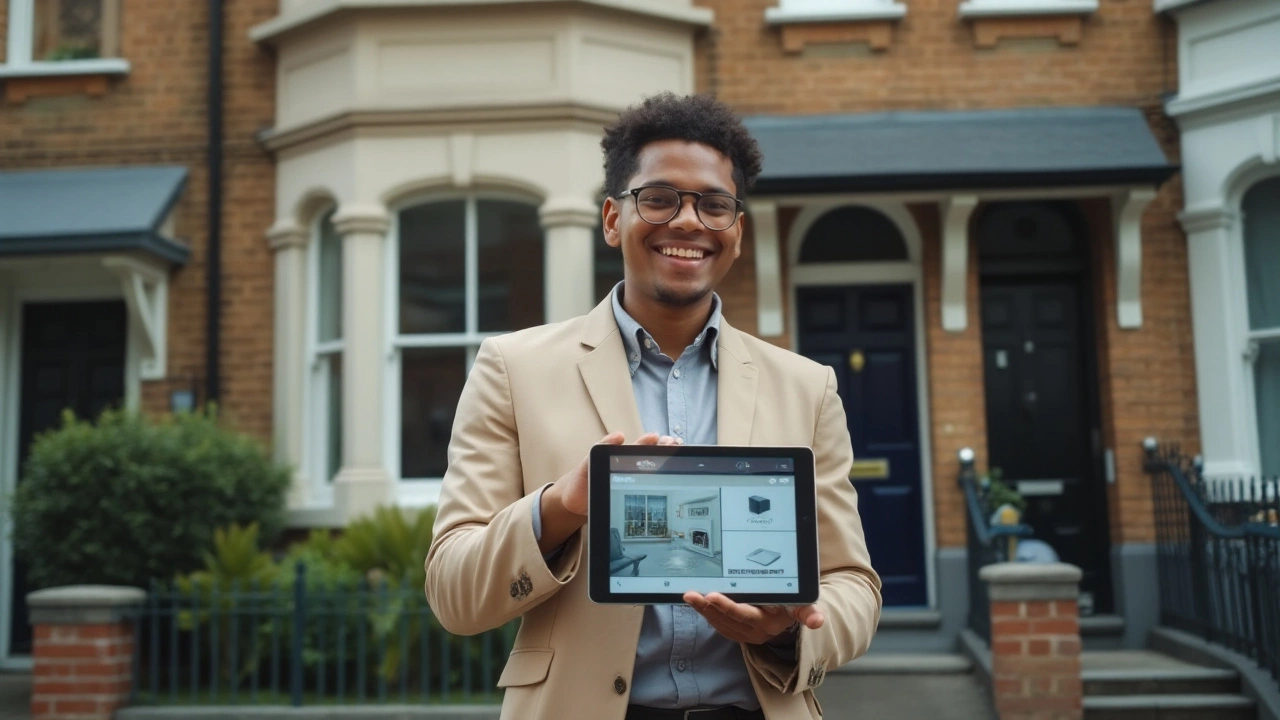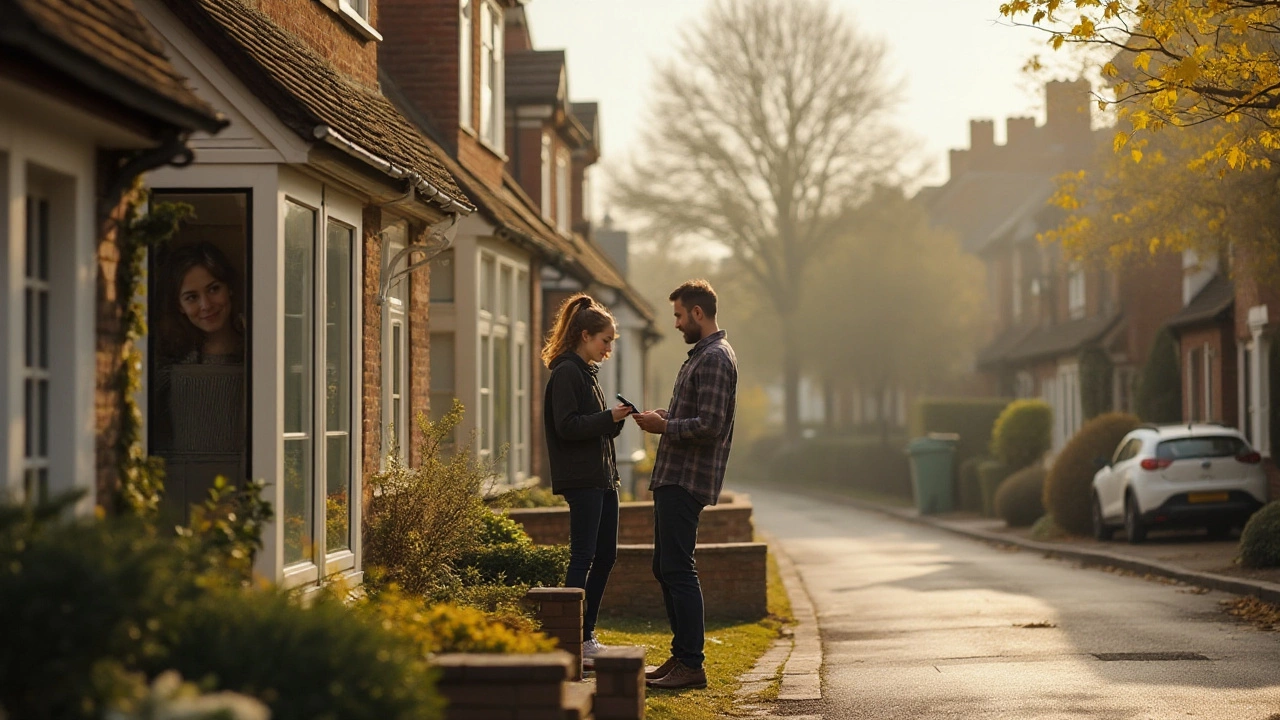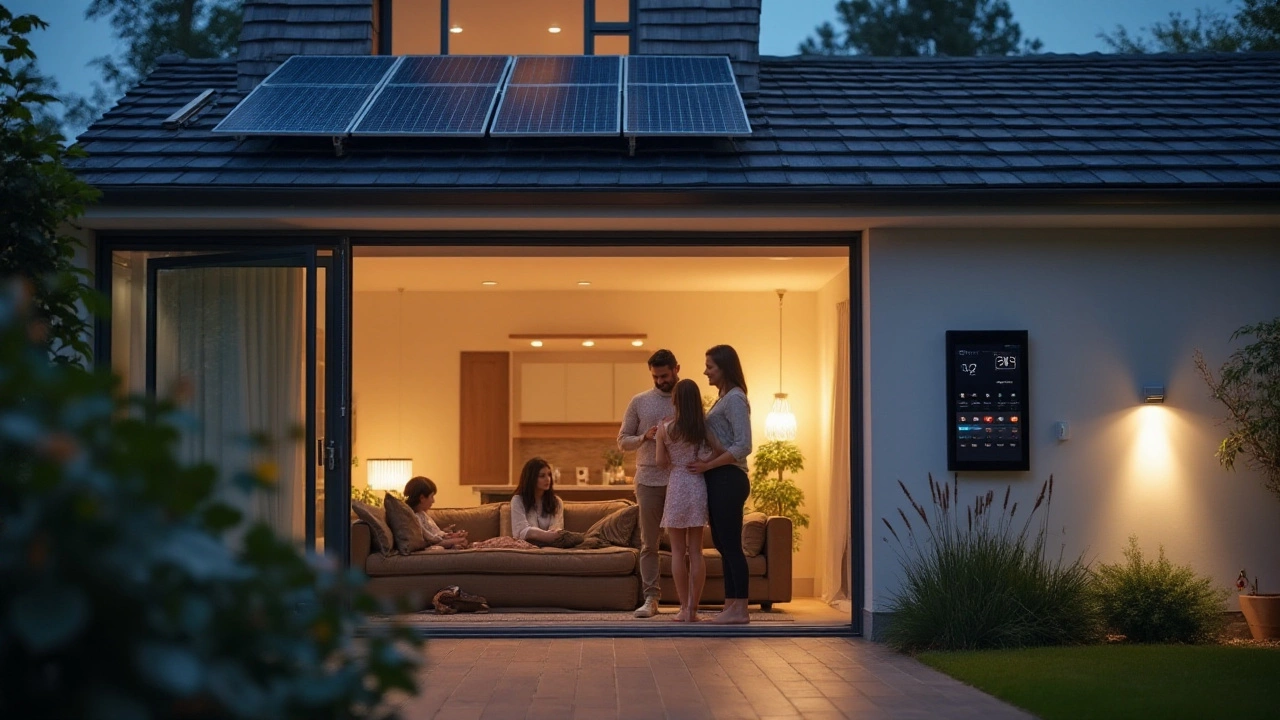In the dynamic world of real estate, where first impressions can shape buying decisions, homeowners are exploring the benefits of integrating smart home technologies. This pivot towards smart systems isn't just about modern aesthetics or convenience—it's a strategic move to enhance property marketability and value.
With a surge in demand for homes equipped with smart security, energy-efficient devices, and integrated automation, the property market is witnessing a shift. Buyers are more inclined toward homes that promise security, efficiency, and modern comforts. We'll delve into how these tech advancements are influencing property values and offer practical tips on getting started with smart home features.
- Introduction to Smart Home Technologies
- Impact on Property Value
- Smart Security Systems Explained
- Buyer Appeal and Market Trends
- Tips for Implementing Smart Home Features
Introduction to Smart Home Technologies
The term smart home often conjures images of futuristic living spaces where everything responds at the touch of a button or even a voice command. At its core, smart home technology refers to homes equipped with devices and systems that automate and optimize functions such as lighting, climate control, and security. These systems are interconnected through the internet, allowing homeowners to control them remotely with a smartphone or a voice-activated assistant. This technology has not only transformed how we interact with our living space but also redefined the expectations of modern homes.
Historically, the roots of home automation date back to the early experiments with central heating systems in the late 1800s, but it wasn't until the late 20th century that technology truly began to catch up with the imagination. By the 1980s and 1990s, simple programmable thermostats and basic security systems became available to homeowners. The real game-changer was the internet and wireless communication advancements that followed, paving the way for today's sophisticated smart home systems. The capacity to control a myriad of home security features from virtually anywhere on the planet marked a significant leap toward comprehensive home automation.
Today, various elements define a smart home, including smart bulbs that adjust for mood lighting, thermostats that learn preferences, and security cameras that send alerts when something amiss is detected. According to a 2023 report by Statista, the global smart home market is projected to grow to over 141 billion U.S. dollars by 2026, highlighting the increasing adoption rate and proliferation of smart devices in everyday homes. One appealing aspect of smart homes is their contribution to energy efficiency. Systems that automate lighting and heating based on occupancy can significantly reduce energy waste.
"It's not just about convenience; it's about conservation," mentions renowned technology analyst Sarah Daniels, emphasizing the eco-friendly angle of smart technology.
One of the crucial areas where smart technology shines is home security. Modern systems now offer comprehensive solutions that integrate cameras, motion detectors, and even facial recognition technology to provide a fortress-like sense of safety. Imagine being on vacation miles from home and having the ability to check cameras, lock doors, or even respond to a visitor at the door through video intercom. These technologies not only offer peace of mind but strike a convincing note with potential property buyers, making properties equipped with these systems significantly more attractive. Smart locks and doorbells exemplify how simple changes can imbue even older homes with a cutting-edge edge, bolstering their market value.
For those considering diving into the world of smart homes, understanding the diverse range of products available can seem overwhelming. Brands like Ring, Nest, and Philips Hue have entered mainstream consciousness, shaping consumer expectations. These products are designed with interoperability in mind, often allowing seamless integration into existing platforms, such as Google Home or Amazon's Alexa. A key consideration for potential adopters is interoperability, ensuring that different devices can communicate effectively. This effectively eliminates 'gadget islands' where devices are independently smart but collectively ineffective. The beauty of the modern smart home lies in its adaptability, offering solutions that range from basic entry-level devices to comprehensive systems that cater to tech enthusiasts.
Impact on Property Value
The way we perceive home value is undergoing a significant transformation, and smart home technologies are at the heart of this change. Real estate experts increasingly recognize the tangible benefits of smart home features, with data indicating that these innovations can increase a property's market value. A well-integrated smart home system can elevate a property's appeal, potentially yielding a higher return on investment. This value boost is not just about being trendy; it encompasses practical benefits like improved security and energy efficiency that contemporary buyers are actively seeking.
Consider the inclusion of a comprehensive smart security system. The peace of mind it offers isn't just a temporary perk—it's a long-term investment that many buyers are willing to pay a premium for. This isn't speculative; statistics reveal that homes with smart features sell for up to 5% more than those without, depending on the market. Such systems, which often include video doorbells, smart locks, and cameras, align perfectly with the modern buyer's expectations of safety and convenience, tapping into their desire for innovation and protection.
"Smart homes are the wave of the future, driving both demand and value in a competitive housing market," says Jane Reynolds, a property analyst with over two decades of experience.
Moreover, energy-saving smart devices contribute significantly to enhancing property value. Buyers today prioritize sustainability, and energy-efficient technologies meet this demand by reducing utility costs and carbon footprints. Smart thermostats, automated lighting, and energy-efficient appliances not only appeal to eco-conscious buyers but also promise long-term savings, making properties equipped with these features particularly attractive. A recent survey found that 60% of buyers showed increased interest in properties with energy-efficient devices, underscoring the growing importance of such technologies in home valuation.
For sellers looking to capitalize on these trends, it's crucial to strategically invest in smart technologies without going overboard. While certain upgrades may yield a substantial value increase, others might not provide the same return. Focusing on essential systems like security and energy efficiency often strikes the right balance, appealing to the broadest range of potential buyers and enhancing the property's desirability in a tech-driven real estate landscape.

Smart Security Systems Explained
When it comes to enhancing home security, smart home technology is a game-changer. These systems integrate various devices like cameras, locks, alarms, and lights, all connected through the internet, offering homeowners unprecedented control and monitoring capabilities from virtually anywhere in the world. As these systems become more prevalent, it's important to understand what sets them apart from traditional security solutions. Many of these smart systems are not only reactive—alerting homeowners to breaches—but they are also proactive, using advanced sensors and AI to predict potential threats.
Smart cameras, for example, now come equipped with motion detection, facial recognition, and night vision, allowing homeowners to keep an eye on their property at all times. Integration with mobile apps enables real-time alerts, so when the camera detects unusual activity, users receive instant updates on their smartphones. This gives homeowners the peace of mind that they can act swiftly, whether they are at home or away. Doors are smarter too, with keyless entry systems controlled via mobile devices. Homeowners can lock and unlock doors remotely, and grant temporary access to visitors or service workers, all while keeping track of those who enter and leave the premises.
Home security isn't solely about preventing break-ins. It also encompasses the health and safety of the household. Smoke detectors, carbon monoxide alarms, and water leak sensors are among the devices that now come with smart capabilities. They can alert both the inhabitants and local emergency services in case of anomalies, minimizing damage and risk. These devices are often linked to a central hub or a cloud-based system, ensuring seamless communication between them. Additionally, smart lighting systems that simulate the presence of people at home during holidays or work trips can deter would-be intruders.
"Smart home security systems not only protect your property but also provide a sense of empowerment to homeowners," states a report from TechCrunch. "The ability to control and monitor via smartphones increases not only the security but also the overall convenience and efficiency of managing one's home."
In understanding the mechanics behind technology-enhanced security, it becomes clear why these systems can boost a property's value. Potential buyers are looking for homes that offer safety solutions integrated seamlessly with their everyday lives. The demand for real-time information and control is transforming security systems into a desirable feature, regarded not just as an amenity but as a serious investment. As technology continues to evolve, the line between luxury and necessity becomes blurred, and smart systems are increasingly seen as standard expectations rather than add-ons.
Finally, when implementing smart security solutions, costs have become more affordable, debunking the myth that smart tech is only for high-end homes. With the ability to customize according to personal needs and the option to start small and expand, these systems are accessible to a wide range of homeowners. Collaboration between tech companies has made compatibility across different devices smoother, allowing for a diverse array of features and innovations. As such, exploring the selection of devices and understanding their benefits is crucial for homeowners aiming to enhance both their security and their property’s value.
Buyer Appeal and Market Trends
The surge in the popularity of smart home technology is redefining how buyers perceive property value today. While traditional home features like space, location, and design remain important, modern buyers are increasingly prioritizing homes equipped with technological advancements. This shift is driven partly by the younger generations—Millennials and Gen Z—who are entering the housing market in larger numbers. These tech-savvy individuals expect homes to complement their digital lifestyles, seeking functionalities that offer convenience, security, and efficiency. For them, a home with integrated home security systems, energy-efficient appliances, and automation represents not just comfort, but a lifestyle choice aligned with their values of sustainability and control.
Current market trends show a positive correlation between the presence of smart home features and higher property appraisals. As technology continues to advance, properties that incorporate these systems can command premium prices. This trend is reflected in recent studies, such as a Coldwell Banker survey that discovered nearly half of millennial homeowners have one or more smart features in their homes. Interestingly, this demand isn't confined to urban areas; even suburban and rural properties see rising interest in smart technologies as remote work becomes commonplace, prompting relocations and a desire for modern amenities. According to a report by Statista, the smart home market is expected to grow to an estimated $135.3 billion by 2025.
"Today's homebuyers, from first-time purchasers to those seeking once-in-a-lifetime dream properties, are turning to smart technology not just as a luxury, but as a necessity," notes a leading property analyst.
Real estate agents, recognizing the evolving preferences of buyers, are now increasingly emphasizing smart technology as selling points. Listings that highlight features like integrated alarms, networked cameras, and smart thermostats tend to attract more views and offers, suggesting that advertising these aspects can effectively enhance a property's marketability. To adequately equip homes and meet these growing expectations, some agents collaborate with technology consultants or interior designers to assess and implement feasible upgrades that won't break the bank but will ensure a solid return on investment.
In this ever-competitive market, a strategic approach to meet buyer demands with technology can make a significant difference. Implementing such upgrades not only enhances the property physically but also adds perceived value, creating a sense of security, energy savings, and enjoyment that resonates with today's discerning buyers. As these trends continue to evolve, staying informed and proactive about smart home developments will be key for homeowners seeking to maximize their property's appeal and financial return.

Tips for Implementing Smart Home Features
Deciding to transform your residence into a smart home can feel like navigating a labyrinth, but with the right guideposts, the journey can be exhilarating and fruitful. Begin by pinning down what you really want out of this transformation. Are you looking to enhance security, reduce energy consumption, or simply add some modern flair to your dwelling? Answering these questions up front can save you both time and resources. It's no secret that home security tops the list for many, as a robust security system not only protects your family but also acts as a significant selling point should you decide to move. A comprehensive plan might include smart cameras, doorbells, and alarm systems all syncable through a single app.
Before diving into purchasing gadgets, consider the compatibility of the smart devices with what you already own. The market is flooded with various platforms like Google Assistant, Amazon Alexa, and Apple HomeKit—each offering a unique ecosystem. Sticking to one platform can simplify your setup and usage. Think of it like building a team: cohesion and seamless communication are key. You wouldn't want your smart thermostat by one brand and your smart lighting by another, unable to 'speak' efficiently. Make sure these devices support the wireless network in your home. An unstable connection could leave you frustrated, turning smart features into tech nightmares rather than conveniences.
"Technology is best when it brings people together," said Matt Mullenweg, and smart home technology, despite being about devices, must ultimately enhance our way of living harmoniously.
Once the foundation of compatible devices is laid, you can begin integrating more specialized tech, such as smart locks and thermostats, which directly contribute to your home's value. Focus on features that offer a clear ROI, like energy-saving solutions, which not only appeal to eco-conscious buyers but also cut utility costs. Did you know that intelligent thermostats can save you up to 15% on annual energy bills? That's a compelling argument for investment, and such savings are immediately attractive to potential home buyers.
Security cameras have evolved dramatically, offering high-resolution capabilities and cloud recording that ensures footage isn't lost. Incorporating smart lighting not only adds ambience but also improves security; lights that mimic your habits can deter potential intruders. Consider systems that allow remote access, enabling you to draw the curtains or or change thermostat settings from miles away, creating the illusion of occupancy when you're out.
Financial considerations can't be overlooked. Although the initial outlay for sophisticated systems might seem steep, think long-term. Prioritize what will elevate the home's value based on buyer interest in your area. A neighbor's smart home setup that involves only basic automation might indicate an opportunity to stand out with superior smart home innovations. Don't underestimate the impact of a tidy, instructive demonstration during viewings. That flashing Alexa-activated porch light or the seamless blinds that shield against afternoon heat could just seal the deal with a touch of magic.

